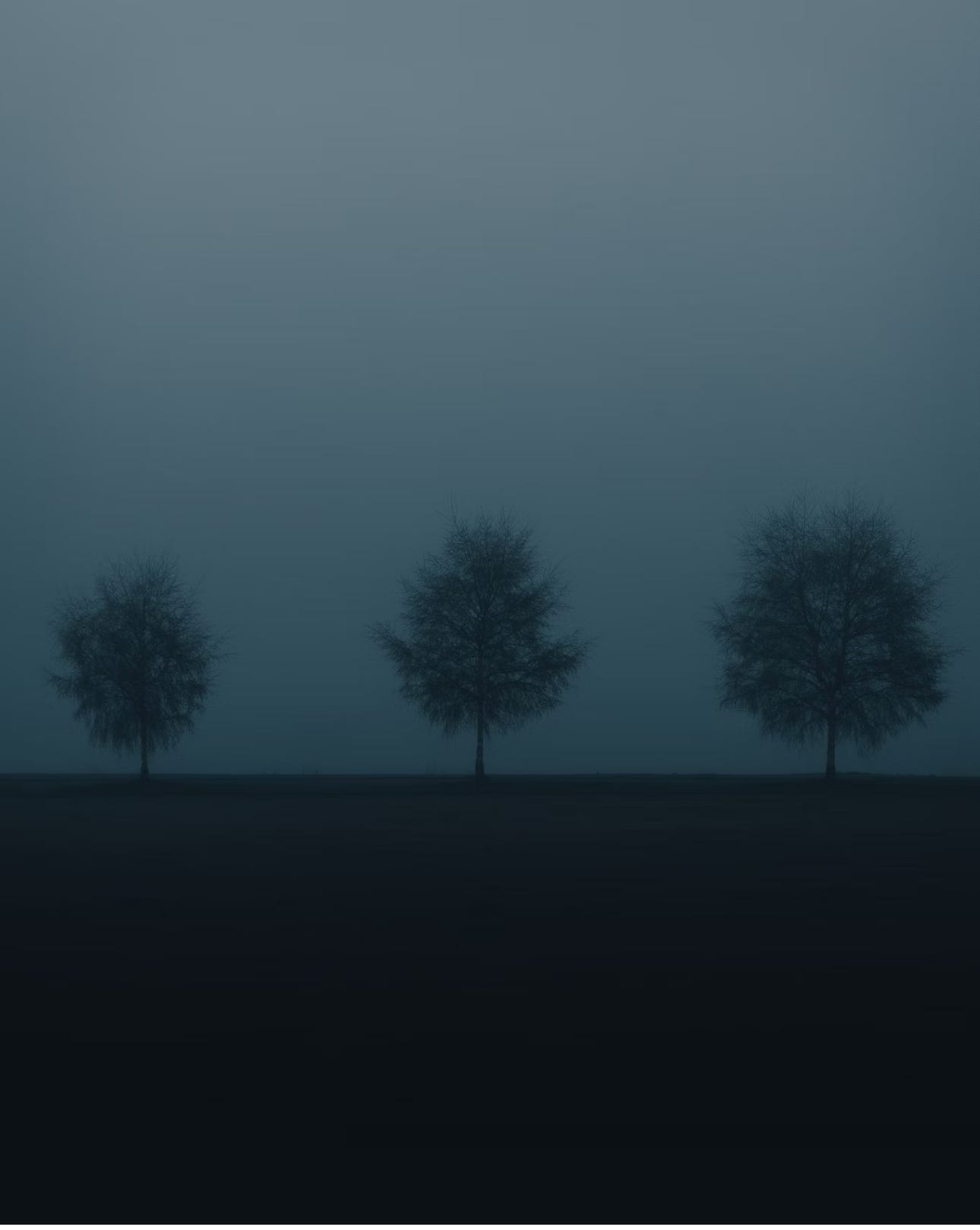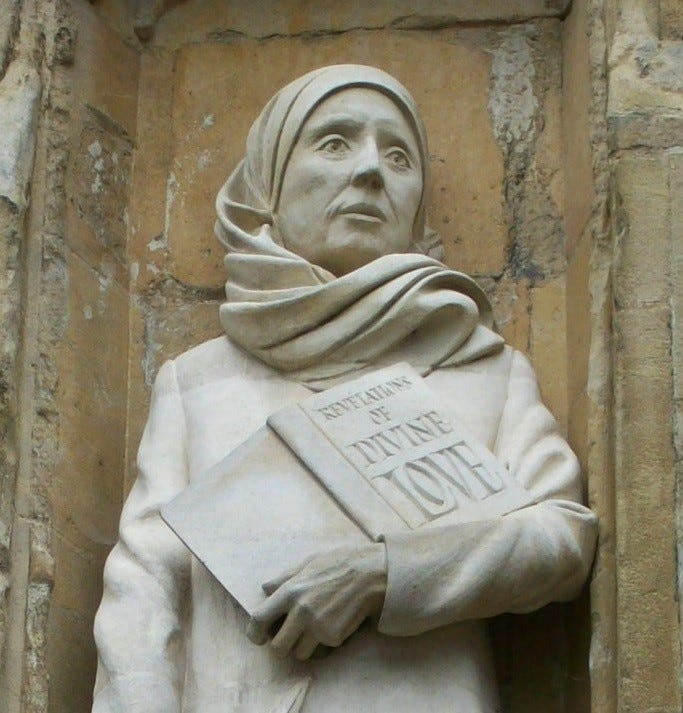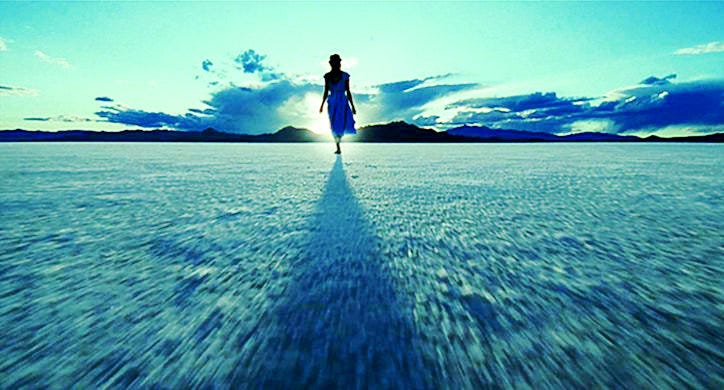Dark as Midnight, Part 3
part three of a three part Brian Zahnd sermon series on the Book of Job
This is the first of two sermon reflections for Sunday, October 25, 2025. In this essay I share my reflections about Brian Zahnd’s sermon on the end of the Book of Job.
image Sasha Matic via Unsplash
“God is with us this is not the end.” — Brian Zahnd
To recap from last week, the story of Job describes the experience of a man named Job, a pious and blameless man who had a good and wealthy life and who fell on hard times. G-d allowed The Accuser, called Ha Satan in Hebrew, to test Job’s faith by inflicting various hardships and trials on him. The book begins with a prosaic prologue which sets up the story. It moves onto the poetic exposition of the story. The book ends with a prosaic epilogue with ties up loose ends, and tells of G-d restoring the things Ha Satan took from Him during the trial.
Part three of Dark as Midnight will cover the end of the book of Job.
Job 1:1 There was once a man in the land of Uz whose name was Job. That man was blameless and upright, one who feared God and turned away from evil.
Job was a blameless man caught in a contest between the Divine and the Diabolical, a conflict of which he knew nothing. Job’s friends, who should have been comforters, became his accusers. Job wants to tell Gd his life is unfair. Job wants to question Gd.
In Job 23: 3-4 and 8-9 Job expresses his desire to see G-d and question him.
3 O that I knew where I might find him,
that I might come even to his dwelling!
4 I would lay my case before him,
and fill my mouth with arguments
8 ‘If I go forward, he is not there;
or backward, I cannot perceive him;
9 on the left he hides, and I cannot behold him;
I turn to the right, but I cannot see him.
“I hear the ancient footsteps like the motion of the sea sometimes I turn there’s someone there, other times it’s only me…” — Bob Dylan, Grain of Sand
Summary and Exegesis
Suddenly, in chapter 38 G-d answers Job out of the whirlwind, He asks Job questions about creation. This continues up to chapter 40. Job knows nothing about creation.
We know nothing of creation or G-d’s way. We lack faith in G-d, despite all He’s done, despite creation. We fall away from wonder and grumble and we should know that we don’t know what we don’t know.
Finally in chapter 40 verse 3 Job says he will say nothing. G-d is not satisfied, and in verse 6 says will you answer Me? He continues up to chapter 42. In chapter 42 Job says he has uttered what he didn’t know. Eliphaz, Bildad, and Zophar feel vindicated, until 42:7, when G-d addresses them, saying to Eliphaz, “my wrath is for you,” because they misrepresented Him. G-d tells the friends to ask Job to pray for them because He will listen to Job, who’s proved faithful. Job was blameless. His friends became his accusers. The Lord restored the fortunes of Job, doubling his possessions, and not doubling his children, though. What happened here?
We get a hint of the hope of things to come in 42:12-13 — G-d restores Job’s children. The end is resurrection. The end is apokatastasis, which means restoration.
What did Jesus tell 14th century anchoress Julian of Norwich in a vision? Lady Julian lived through the Black Death and other calamities. Jesus told her this: “all shall be well, and all shall be well, and all manner of things shall be well.”
image: David Holgate’s statue of Julian, outside Norwich Cathedral, completed in 2000
It’s like The Boss (Bruce Springsteen) says, “everything dies baby and there’s a fact but maybe everything that dies some day comes back.”
The Tree of Life
How can we understand the Book of Job? How can we take the wisdom from this book, and use it in our daily life? The next part of the sermon looks at the book of Job through the movie Tree of Life
What’s Tree of Life about? It’s a quiet slow movie, based on the book of Job. It portrays the contrasting ways of nature and grace through the story of the O’Brien family in 1950s small town Texas.
The movie opens with an epigraph from Job 38:4, 7.
“Where were you when I laid the foundations of the earth?...When the morning stars sang together, and all the sons of God shouted for joy?”
At the beginning of the story, we see and hear a flame, it represents G-d.
“Brother. Mother. It was they who led me to your door.”
The movie begins with a present day (2011) middle aged man named Jack O’Brien praying. The movie is a prayer of a middle aged man who’s turning back toward G-d, and reflecting on his life. The film unfolds in a non linear fashion, it tells the story in memory flashes. A tree in the yard appears often in the memory flashes.
We have a choice of two ways through life—nature or grace.
We then hear Jack’s mother praying, and we see scenes from her life flash before us whilst she prays.
“The nuns taught us that there are two ways through life—the way of nature and the way of grace. You have to choose which one you will follow. Grace doesn’t try to please itself, accepts being slighted, forgotten, disliked; accepts insults and injuries. Nature only wants to please itself. Get others to please it too. Likes to Lord it over them, to have its own way. It finds reasons to be unhappy when all the world is shining around it, when love is smiling through all things. They taught us the no one who loves the way of grace ever comes to a bad end. I will be true to you whatever comes.”
Then Mrs. O’Brien receives a telegram that says her youngest son is dead—killed in Vietnam at age 19. The world comes to a screeching halt for the parents. Mrs. O’Brien prays for G-d to be with her fallen son. He was in G-D’s hands the whole time. She recites Psalm 23 and also asks G-d what did you gain? She wants to know why, and few understand her grief. He gives and takes away, her mother tells her. Mr. O’Brien feels his grief as regret and shame at that regret. Where is grace?
The Flame shows us flashes of life.
Jack asks, How did you come to me? In what shape? What disguise? He lights a candle in an empty house. He thinks of his long dead brother. Jack works as an architect. The world’s gone to the dogs, people are greedy, keep getting worst. I try to get into their hands. Jack calls his dad to apologise for something he said. It feels like Jack and his dad live in the death of their son and brother. How did I lose you? Wandered. Forgotten you. Jack climbs a rocky slope, it’s sandy and desert like, it looks a bit beachy. He walks through the busy city.
Find me, says the voice of young Jack from a rippled sandy ocean shore.
How did she bear it? Mother. We hear Mrs. O’Brien scream and we see the crown of a tree set against the sky. The undulations of a murmuration.
Was I false to you? Mrs. O’Brien prays. After the funeral Mrs. O’Brien walks through the forest, looking at the crowns of the trees. She asks G-d, “Lord, why? Where were you? Did you know? Who are we to you? Answer me?” The Flame shows us the frightening and wondrous glory of the cosmos. We cry to you. My soul. My son. Hear us. We see 17 minutes timeline of creation from Big Bang beginning to 1950/60s Waco. We see life emerging from creation. Jellyfish. A forest of sea kelp. Sand. Terrestrial forest. The ocean. Jurassic creatures. Teeming life, the pulse of life. Tree crowns, always the tree crowns we see, as of to remind us to look up and remember wonder. A dying parasauralophus. Life, my life. I searched for you. My hope. My child.
Creation roars in a thunder.
You spoke to me through her. You spoke with me from the sky, the trees, before I knew I loved you, believed in you. Jack walks on a rocky uneven terrain in a remote wilderness location. When did you first touch my heart? Jack prays as we see the tree crown again. We see the life of the O’Brien family unfurling. We see birth from the inside, and from the outside. First steps. First words. A butterfly. Death. New life. Planting a tree. Go far. Yeah. Learning boundaries. The tree grows. Jack and his brothers grow. Father. Make me good, brave. We see the ugliness of man’s creation contrasted with the magnificence of G-d’s creation. Misfortune and suffering. Can it happen to anyone? Nobody talks about it. Help me be thankful for everything. Where do You live? Are You watching me? I wanna know what You are. I wanna see what You see.
What is the way of nature? What is the way of grace? In 1950s Jack discovers unjust suffering, and sorrow. We see the O’Brien family, a Christian family in small town Texas — mum, dad, and three sons. We see a particular Sunday—Mr. O’Brien plays the pipe organ, we hear a sermon about Job.
Misfortune befalls the good. We can’t protect ourselves against it. We can’t protect our children. We can’t say to ourselves if if I’m not happy I’m going to make sure they are. We run before the wind. We think that it will carry us forever. It will not. We vanish as a cloud. We wither as the autumn grass, and like a tree are rooted up. Is there some fraud in the scheme of the universe? Is there nothing which is deathless? Nothing which does not pass away? We cannot stay where we are. We must journey forth. We must find that which is greater than fortune or fate. Nothing can bring us peace but that. Is the body of the wise man or the just exempt from any pain, from any disquietude, from the deformity that might blight its beauty from the weakness, that might destroy its health? Do you trust in G-d? Job, too, was close to the Lord. Are your friends and children your security? There is no hiding place in all the world where trouble may not find you. No one knows when sorrow might visit his house, any more than Job did. The very moment everything was taken away from Job, he knew it was the Lord who’d taken it away. He turned from the passing shows us time, he sought that which is eternal. Does he alone see G-d’s hand who sees that He gives? Does not also the one who sees G-d’s hand is the one who sees that He takes away? Or does he alone see G-d who sees His face turn towards him? Does not also he sees G-d who sees G-d turn His back?
Mr. O’Brien tells his sons they can’t be too good if they want to succeed.
Make some stories. Original words. He says don’t put your elbows on the table. He does. Insults people. Doesn’t care.
A child drowns. Was he bad? Where were you? You let a boy die. You let anything happen. Why should I be good if You aren’t?
Mr. O’Brien tells Jack, “Toscanini recorded a piece 65 times and said afterwards it could’ve be better.” He tells Jack he controls his own destiny.
Why does he hurt us, our father? He lies, pretends.
Mr. O’Brien is abusive and hard hearted. He beats his kids and blames their mother for his own failures as a parent. He abuses Mrs. O’Brien. The attic. Mr. O’Briens leaves, ‘on a trip.’
Mrs O’Brien tells her sons, Help each other. Love everyone, every leaf, every ray of light. This a quote from Dostoevsky’s Elder Zosyma—a quote about loving every leaf and every ray of life. Forgive. Jack’s dad returns and his parents fight, Mr. O’Brien yells and behaves abusively.
“Love God’s creation, love every atom of it separately, and love it also as a whole; love every green leaf, every ray of God’s light; love the animals and the plants and love every inanimate object” — Dostoevsky
“It was an experiment,” said Jack’s brother when they blew up a frog with a firework. Liar. Things you got to learn. How can we know stuff until we look? Jack discovers temptation and sin. I can’t talk to you, don’t look at me. What have I started? What have I done? Jack behaves defiantly, tells his mother he doesn’t want to do whet she asks, she says she lets Mr. O’Brien walk all over her. How do I get back where they are?
“You’d like to kill me,” Jack tells his dad. Then asks his mother, “Dad, why was he born?” He considers lowering the winch holding the car up when his dad is underneath fixing it. Please G-d kill him. Let him die. Get him out of here. “She only loves me,” Jack screams at his dad. Jack shoots his brother in the finger with a pellet gun. What I want to do I can’t do. I do what I hate. What was it you showed me? I didn’t know how to name you then. But I see it was you. Always you were calling me.
I wanted to be loved because I was great. A big man. I’m nothing. Look … at the glory around us. Trees and birds. I lived in shame. I dishonoured it all and didn’t notice the glory. I’m a foolish man. (Mr. O’Brien’s prayer).
Father. Mother. Always you wrestle inside me. Always you will.
The family has to move when Mr. O’Brien loses his job. Mrs. O’Brien sits with a lit candle, the same one Jack lights in the present day.
“The only way to be happy is to love. Unless you love your life will flash by. Do good to them. Wonder. Hope.”
Present day Jack rides an elevator in an office building. Then he’s walking in the wilderness. Brother. He walks through a wooden frame that resembles a door frame. We see a gaseous mass that looks like the sun. As Jack is turning his life back to G-d in midlife he has a vision of the distant future — the sun becomes a red giant engulfs the earth and then collapses into a white dwarf in a cold silent space and earth is no more—but it’s not the end.
Seeing this vision, Jack prays, “Keep us. guide us. till the end of time.”
Follow me. Young Jack meets present day Jack, beckons him.
The final scene shows the resurrection on a beach. We hear the music Angus Dei from “Requiem, Grande messe des morts, Op. 5: Offertorium: Domine Jesu Christe” by Berlioz. We see people raised from the dead, coming out of graves. We see the living help the dead climb out of the grave. Old people become young, people embody all ages, they embody all time. We see families reunited. We see creation united. The mask falls, sinks into the sea. We witness the birth of a new world as a chorus sings Amen. We come upon an endless sea of sunflowers.
“I give him to you, I give you my son,” says Mrs. O’Brien.
“Behold, I am making all things new … The steadfast love of the Lord never ceases; his mercies never come to an end; they are new every morning; great is your faithfulness.”
The movie flashes to present day with a middle aged Jack in Houston. The movie ends with a shot of The Flame, because G-d is the beginning and the end, and the middle, and all things, for all time.
Reader, we find ourselves thrown into this world filled with injustice, temptation, sorrow; we can only find joy through love. Unless you love, your life will flash by in a meaningless blur. We are nothing without love. Do good to those around you, comfort rather than blame, don’t lose wonder, you’re invited to the wonder of being. Cry out to G-d in your despair, He hears you, and He responds in His own way and time. Reader, we’re here, as a part of this world, wonder and hope. What are we hoping for? How do we wish to love, and be loved? What glories around us do we miss? Why do we expect that we will escape hardship and tribulations? Why do we choose to blame those we see experiencing hardship and tribulations? Why didn’t we choose grace? We can choose grace now.






